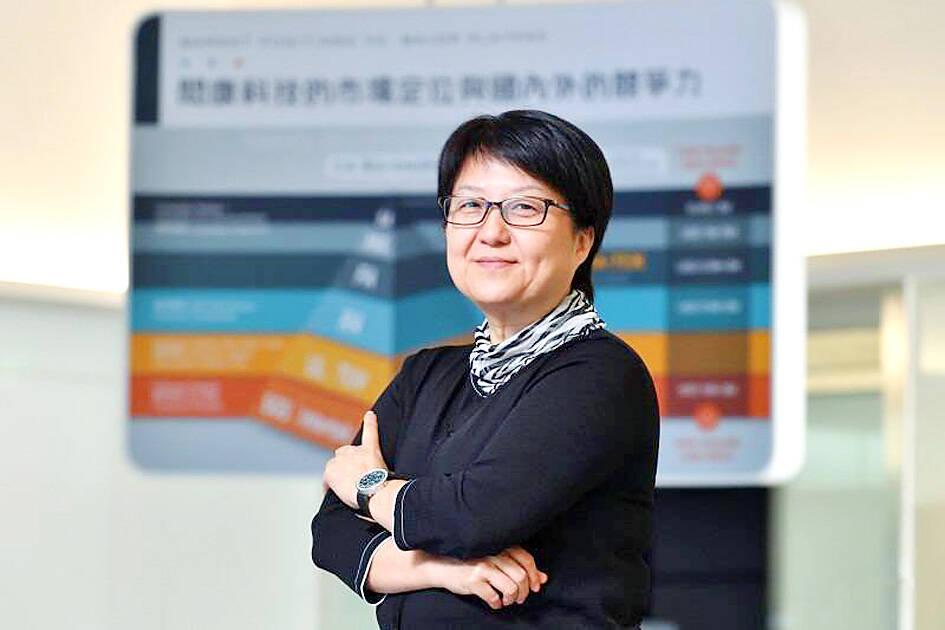Materials Analysis Technology Inc (MA-tek, 閎康) yesterday said it is experiencing strong demand for its advanced burn-in testing services from leading global artificial intelligence (AI) chip developers, including Nvidia Corp.
MA-tek, which specializes in materials analysis and failure and reliability testing for semiconductor firms and equipment manufacturers, has secured more than 10 projects for high-end chip testing, company chairwoman Hsieh Yong-fen (謝詠芬) said.
The company is expanding its client roster for ultra-high-power burn-in testing to include Advanced Micro Devices Inc (AMD), Intel Corp, Amazon.com Inc, Google and Meta Platforms Inc, Hsieh said.

Photo: Chen Mei-ying, Taipei Times
To meet rising demand, the company has invested NT$100 million (US$3.39 million) in new equipment, which has been installed at its lab in Hsinchu, she said.
The new projects are expected to begin contributing to revenue by the end of this year at the earliest, she said, adding that they would help boost the company’s revenue in the second half to surpass the first half.
MA-tek reported revenue of NT$2.11 billion for the first five months of the year, an annual growth of 3.4 percent.
Burn-in testing is a reliability assessment for integrated circuits, in which devices are exposed to elevated temperatures and ultra-high voltages over an extended period. The process accelerates the detection of early failures, allowing manufacturers to identify and eliminate weak or defective components, thereby improving product reliability.
In April, Hsieh said that due to the technological complexity involved, it takes more than six months for new orders to begin generating revenue, significantly longer than traditional burn-in testing timelines.
Hsieh also said that Taiwan is poised to become one of the world’s most important providers of such ultra-high-power burn-in testing services, citing the sector’s high entry barriers in capital investment and analytical capabilities.
MA-tek in April introduced its most advanced analytical tool — a Cs-corrected scanning transmission electron microscope — to provide advanced material and failure analysis services for contract chipmakers, as well as advanced chip packaging and testing.
The new equipment is intended to support customers in accelerating the mass production of 2-nanometer chips.
The microscope, which costs US$5 million — about three times more than conventional equipment — offers ultra-high resolution, making it particularly suited for analyzing AI and vehicle chips, the company said.
Shareholders yesterday approved a cash dividend of NT$7 per common share, the lowest in three years.
The company attributed the reduced dividend to a heavy investment cycle over the past three years, which it expects would begin delivering returns from this year.

Taiwan’s long-term economic competitiveness will hinge not only on national champions like Taiwan Semiconductor Manufacturing Co. (TSMC, 台積電) but also on the widespread adoption of artificial intelligence (AI) and other emerging technologies, a US-based scholar has said. At a lecture in Taipei on Tuesday, Jeffrey Ding, assistant professor of political science at the George Washington University and author of "Technology and the Rise of Great Powers," argued that historical experience shows that general-purpose technologies (GPTs) — such as electricity, computers and now AI — shape long-term economic advantages through their diffusion across the broader economy. "What really matters is not who pioneers

In a high-security Shenzhen laboratory, Chinese scientists have built what Washington has spent years trying to prevent: a prototype of a machine capable of producing the cutting-edge semiconductor chips that power artificial intelligence (AI), smartphones and weapons central to Western military dominance, Reuters has learned. Completed early this year and undergoing testing, the prototype fills nearly an entire factory floor. It was built by a team of former engineers from Dutch semiconductor giant ASML who reverse-engineered the company’s extreme ultraviolet lithography (EUV) machines, according to two people with knowledge of the project. EUV machines sit at the heart of a technological Cold

TAIWAN VALUE CHAIN: Foxtron is to fully own Luxgen following the transaction and it plans to launch a new electric model, the Foxtron Bria, in Taiwan next year Yulon Motor Co (裕隆汽車) yesterday said that its board of directors approved the disposal of its electric vehicle (EV) unit, Luxgen Motor Co (納智捷汽車), to Foxtron Vehicle Technologies Co (鴻華先進) for NT$787.6 million (US$24.98 million). Foxtron, a half-half joint venture between Yulon affiliate Hua-Chuang Automobile Information Technical Center Co (華創車電) and Hon Hai Precision Industry Co (鴻海精密), expects to wrap up the deal in the first quarter of next year. Foxtron would fully own Luxgen following the transaction, including five car distributing companies, outlets and all employees. The deal is subject to the approval of the Fair Trade Commission, Foxtron said. “Foxtron will be

INFLATION CONSIDERATION: The BOJ governor said that it would ‘keep making appropriate decisions’ and would adjust depending on the economy and prices The Bank of Japan (BOJ) yesterday raised its benchmark interest rate to the highest in 30 years and said more increases are in the pipeline if conditions allow, in a sign of growing conviction that it can attain the stable inflation target it has pursued for more than a decade. Bank of Japan Governor Kazuo Ueda’s policy board increased the rate by 0.2 percentage points to 0.75 percent, in a unanimous decision, the bank said in a statement. The central bank cited the rising likelihood of its economic outlook being realized. The rate change was expected by all 50 economists surveyed by Bloomberg. The